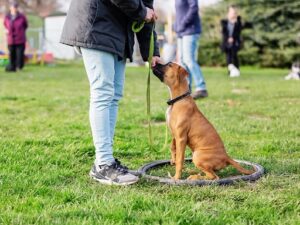Welcoming a new puppy into your home is an incredibly exciting and rewarding experience. However, ensuring your new furry friend grows into a well-behaved and happy companion requires consistent training. Proper training not only establishes a strong bond between you and your puppy but also helps inculcate good behavior and manners. Here are some essential tips and strategies for training your new puppy effectively:
Start Early: The Importance of Early Training
Training Age: Begin training your puppy as early as possible, preferably as soon as you bring them home. Puppies are like sponges at a young age, eager to learn and adapt. The first few weeks are crucial for establishing routines and teaching basic commands.
Socialization: Expose your puppy to various environments, people, and other animals to help them become well-adjusted and comfortable in different situations. Early socialization is key to preventing fear and aggression issues in the future.
Basic Commands: Start with basic commands like sit, stay, come, and heel. Consistency is key—use the same commands and gestures to help your puppy understand and respond.
Positive Reinforcement: Reward-Based Training
Treats and Affection: Use positive reinforcement techniques by rewarding your puppy with treats, praise, or affection every time they exhibit the desired behavior. This creates a positive association and motivates them to repeat the behavior.
Consistency: Consistency is vital in positive reinforcement. Reward your puppy immediately after they follow a command correctly to reinforce the action.
Avoid Punishment: Avoid scolding or physical punishment. Positive reinforcement is more effective and strengthens the bond between you and your puppy.
Establish a Routine: Consistency is Key
Regular Schedule: Establish a routine for feeding, walking, playtime, and training sessions. Dogs thrive on routine and predictability, which helps in their overall behavior and learning process.
Potty Training: Consistency is crucial for successful potty training. Take your puppy outside frequently, especially after meals or naps. Reward them when they eliminate outside to reinforce the behavior.
Sleep Schedule: Establish a consistent bedtime and sleeping area for your puppy. Adequate rest is essential for their health and behavior.
Patience and Persistence: Training Takes Time
Be Patient: Remember, training a puppy takes time and patience. Do not get discouraged by setbacks or slow progress. Each puppy learns at its own pace.
Repetition: Repetition is key to reinforcing behaviors. Practice commands regularly in different environments to ensure your puppy understands and follows them consistently.
Professional Help: If you encounter difficulties or feel overwhelmed, consider seeking help from professional dog trainers or behaviorists. They can provide guidance and support in your training journey.
Health and Care: A Happy Puppy is an Obedient Puppy
Regular Vet Visits: Ensure your puppy receives regular veterinary check-ups, vaccinations, and necessary healthcare. A healthy puppy is more likely to be responsive and eager to learn.
Exercise and Play: Provide ample opportunities for exercise and play. A well-exercised puppy is more focused and responsive during training sessions.
Nutrition: A balanced diet is essential for your puppy’s overall health and behavior. Consult your vet for appropriate dietary recommendations.
Training a puppy requires dedication, consistency, and a lot of love. It’s a rewarding journey that forms a strong bond between you and your furry companion. Remember, each puppy is unique, and training methods may vary. Stay patient, positive, and committed, and you’ll soon witness the wonderful results of your efforts in your well-behaved and happy pup!



